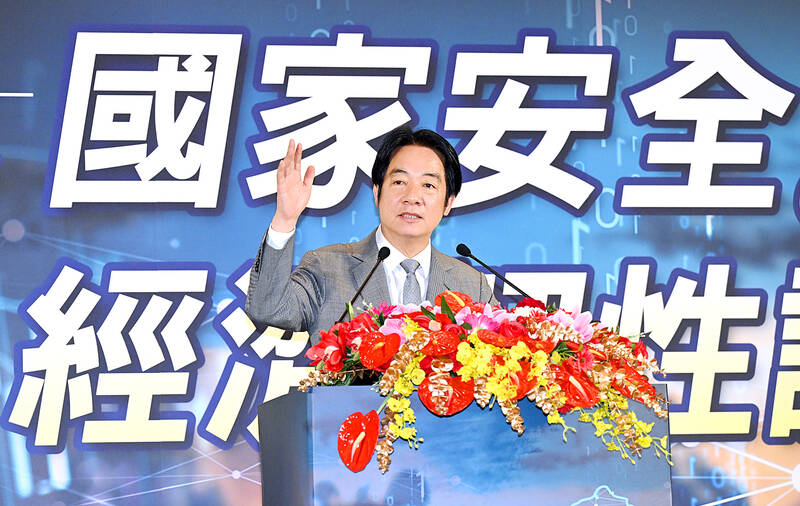President William Lai (賴清德) yesterday outlined four key aspects of Taiwan’s national security resilience at a forum in Taipei, which was hosted by the Liberty Times (The Taipei Times’ sister newspaper) and co-organized by Chunghwa Telecom Co.
The four key aspects of resilience cover supply chain security, digital communications, whole-of-society defense and the economy, Lai said in his speech.
Lai said there is a great need to improve supply chain resilience in the face of geopolitical tensions and global trade volatility.

Photo: Liao Chen-hui, Taipei Times
Taiwan plays a critical role in the global semiconductor supply chain, he said, adding that the government would continue working to improve the country’s key technological capacities.
Regarding digital communications resilience, Lai said the government is promoting multi-layered network construction and protection.
The government is also seeking to deploy sovereign satellites to ensure uninterrupted digital communications under any circumstances, he said.

Photo: Liao Chen-hui, Taipei Times
Meanwhile, a nation's resilience must be built on the confidence and cohesion of its people, not on national defense alone, Lai said.
He emphasized that only with the participation of all citizens can "whole-of-society defense resilience" be realized and be able to respond to various challenges.
As for economic resilience, Lai specifically mentioned a government task to assist 1.6 million small and medium-sized enterprises in upgrading and transforming amid the threat of US tariffs.

Photo: Liao Chen-hui, Taipei Times
He also urged financial institutions, within their risk tolerance, to continue offering loans to small and medium-sized businesses during hard times and to overcome difficulties together.
At the forum, Minister of Economic Affairs Kung Ming-hsin (龔明鑫) said Taiwan’s overseas industrial expansion can help the country respond more promptly to natural disasters and global uncertainties.
Taiwan’s industrial clusters, especially in the semiconductor sector, are highly concentrated and efficient, Kung said.
However, they also face risks because of their concentrated nature, he added.
Overseas deployments, together with partnerships with foreign companies, can provide rapid support when operations in Taiwan are disrupted, helping the resilience of the nation’s industrial ecosystem, he said.
For example, a chip company in the US mitigated the effects of a major earthquake in Taiwan a few years ago by dispatching workers and materials from its bases in Japan to Taiwan within 24 hours, he said.
That is “a very good model” made possible by overseas industrial expansion, Kung said.
Opposition parties have raised concerns that expansion — particularly by Taiwan Semiconductor Manufacturing Co (TSMC, 台積電) in the US, where it is building state-of-the-art foundries — risks undermining Taiwan’s competitive edge in semiconductor manufacturing.
TSMC, the world’s largest contract chipmaker, has multiple foundries in Taiwan and in the past few years has expanded its presence to Japan, the US and Germany to produce advanced chips.
Kung described Taiwan’s semiconductor ecosystem as a “model of success,” highlighting its global leadership in technology and efficiency.
“Taiwanese chips should operate around the clock in every corner of the world, demonstrating Taiwan’s economic strength,” he said.

CHAOS: Iranians took to the streets playing celebratory music after reports of Khamenei’s death on Saturday, while mourners also gathered in Tehran yesterday Iranian Supreme Leader Ayatollah Ali Khamenei was killed in a major attack on Iran launched by Israel and the US, throwing the future of the Islamic republic into doubt and raising the risk of regional instability. Iranian state television and the state-run IRNA news agency announced the 86-year-old’s death early yesterday. US President Donald Trump said it gave Iranians their “greatest chance” to “take back” their country. The announcements came after a joint US and Israeli aerial bombardment that targeted Iranian military and governmental sites. Trump said the “heavy and pinpoint bombing” would continue through the week or as long

TRUST: The KMT said it respected the US’ timing and considerations, and hoped it would continue to honor its commitments to helping Taiwan bolster its defenses and deterrence US President Donald Trump is delaying a multibillion-dollar arms sale to Taiwan to ensure his visit to Beijing is successful, a New York Times report said. The weapons sales package has stalled in the US Department of State, the report said, citing US officials it did not identify. The White House has told agencies not to push forward ahead of Trump’s meeting with Chinese President Xi Jinping (習近平), it said. The two last month held a phone call to discuss trade and geopolitical flashpoints ahead of the summit. Xi raised the Taiwan issue and urged the US to handle arms sales to

State-run CPC Corp, Taiwan (CPC, 台灣中油) yesterday said that it had confirmed on Saturday night with its liquefied natural gas (LNG) and crude oil suppliers that shipments are proceeding as scheduled and that domestic supplies remain unaffected. The CPC yesterday announced the gasoline and diesel prices will rise by NT$0.2 and NT$0.4 per liter, respectively, starting Monday, citing Middle East tensions and blizzards in the eastern United States. CPC also iterated it has been reducing the proportion of crude oil imports from the Middle East and diversifying its supply sources in the past few years in response to geopolitical risks, expanding

Pro-democracy media tycoon Jimmy Lai’s (黎智英) fraud conviction and prison sentence were yesterday overturned by a Hong Kong court, in a surprise legal decision that comes soon after Lai was jailed for 20 years on a separate national security charge. Judges Jeremy Poon (潘兆初), Anthea Pang (彭寶琴) and Derek Pang (彭偉昌) said in the judgement that they allowed the appeal from Lai, and another defendant in the case, to proceed, as a lower court judge had “erred.” “The Court of Appeal gave them leave to appeal against their conviction, allowed their appeals, quashed the convictions and set aside the sentences,” the judges